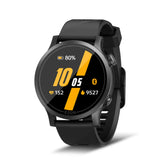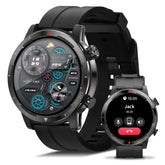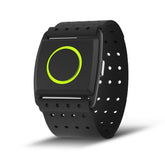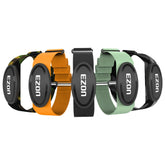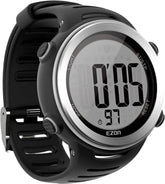Choosing the Right GPS Device for Your Running Needs
Selecting the perfect GPS running watch is crucial for runners who want to track progress, improve performance, and explore new routes with confidence. Whether you’re a casual jogger, a marathoner, or a trail runner, the right GPS device should align with your running needs, balancing accuracy, battery life, and specialized features. In this guide, we’ll break down the key factors to consider and help you make an informed choice.
1. Accuracy: The Foundation of Reliable Data
A GPS device’s primary job is to track your route, pace, and distance with precision. Inconsistent accuracy can lead to skewed training data, so prioritize these features:
Multi-Satellite System Support
- Look for devices that use multiple global navigation satellite systems (GPS, GLONASS, Galileo, BeiDou). This ensures strong signal reception in challenging environments like urban canyons, dense forests, or mountainous terrain.
- EZON GPS Series: Offers multi-band GPS for rapid satellite lock and minimal drift, ideal for runners who train in varied landscapes.
Advanced Sensors
- Barometric Altimeter: Provides accurate elevation data, essential for trail runners and hill training.
- Gyroscope/Accelerometer: Enhances GPS accuracy during low-signal moments (e.g., under trees) by estimating movement when satellite signals are weak.
2. Battery Life: Match Your Running Duration
Battery life varies drastically between devices, so choose one that suits your typical run length:
Daily Training (1–2 hours)
- A watch with 8–12 hours of GPS battery life is sufficient for most daily runs. Look for models that last 7+ days in smartwatch mode for everyday use.
Marathons/Ultramarathons (3+ hours)
- Opt for GPS running watch with 20–40+ hours of GPS battery life. Features like “Battery Saver Mode” (which reduces satellite sampling rate) can extend usage for ultra-distance events.
- EZON GPS Series: Delivers up to 40 hours in GPS mode, ensuring it lasts through full marathons and multi-day trail races.
Key Tip: Always charge to 100% before important runs and carry a portable charger for ultra-events.
3. Features: Tailored to Your Running Style
For Road Runners
- Pace Alerts: Audible/visual cues to keep you on target during tempo runs or race pace efforts.
- Lap Tracking: Automatically marks splits at mile/km markers for easy performance analysis.
For Trail Runners
- Preloaded Maps: Detailed topographic maps for navigating unfamiliar trails (look for models with offline map support).
- Route Navigation: Turn-by-turn directions or backtrack features to avoid getting lost in the wilderness.
For All Runners
- Heart Rate Monitoring: Built-in wrist-based sensors or chest strap compatibility to track intensity and ensure you’re training in the right zones.
- Syncing Capabilities: Integration with apps like Strava, TrainingPeaks, or Garmin Connect to analyze trends and share achievements.
4. Comfort and Usability
A bulky or uncomfortable watch can distract from your run. Consider:
- Weight: Look for lightweight designs (under 60g) to avoid wrist fatigue during long runs.
- Display: A sunlight-readable screen (transflective or AMOLED) that’s easy to check at a glance, even mid-stride.
- Strap Material: Breathable, adjustable straps (silicone or nylon) that stay secure without chafing, with quick-release options for easy swapping.
5. Price and Budget
GPS devices range from budget-friendly to premium models. Define your priorities:
- Entry-Level ($100–$200): Basic GPS and activity tracking, suitable for casual runners.
- Mid-Range ($200–$400): Enhanced features like heart rate monitoring, longer battery life, and multi-sport modes.
- Premium ($400+): Top-tier accuracy, advanced mapping, and recovery metrics for serious athletes.
Which GPS Device Is Right for You?
Casual Runners
- Prioritize ease of use and affordability. A GPS running watch with basic GPS, heart rate, and 10+ hours of battery life will meet most needs.
Marathon/Ultra Runners
- Invest in a high-end model with 30+ hours of GPS battery, multi-satellite support, and detailed elevation tracking to handle long-distance challenges.
Trail Runners
- Choose a rugged, waterproof watch with preloaded maps, offline navigation, and a durable build (e.g., MIL-STD-810G certification for shock resistance).
EZON GPS Running Watches: Precision for Every Runner
- Accuracy: Multi-band GPS and barometric altimeters ensure precise route mapping and elevation data.
- Battery Life: Up to 40 hours in GPS mode, with power-saving features for ultra-endurance events.
- Performance Tools: Pace alerts, lap tracking, and compatibility with popular training apps to help you hit your goals.
- Durability: 5ATM water resistance and lightweight designs, perfect for road and trail runs alike.
Final Tips for Choosing Your GPS Device
- Test Before You Buy: If possible, borrow a friend’s watch or visit a store to test display clarity and strap comfort.
- Read Reviews: Focus on feedback from runners with similar needs (e.g., “great for trail running” or “excellent battery for marathons”).
- Future-Proof Your Choice: Look for devices with software update support to access new features as they’re released.
Find Your Perfect Running Companion
A GPS running watch is more than a gadget—it’s a training partner that empowers you to run with confidence and purpose. By prioritizing accuracy, battery life, and features that match your running needs, you’ll unlock the full potential of your workouts and adventures.
Whether you’re chasing a personal best or exploring new trails, the right GPS device will elevate your running experience. Choose wisely, and let every mile be tracked with precision.
